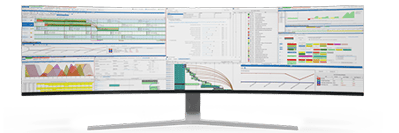AI for Multi-Site Production Coordination
As production planners, your role is pivotal in orchestrating operations across multiple sites to ensure efficiency, cost-effectiveness, and timely delivery of products. However, the complexity of managing multi-site production can often lead to challenges in synchronization, resource allocation, and meeting customer demands. In the food and beverage manufacturing, staying ahead of the curve is not just a competitive advantage; it's a necessity for survival.
Fortunately, advancements in technology, particularly the integration of Artificial Intelligence (AI) with Production Planning software, offer a transformative solution.
In this blog, we'll look into the concept of AI-Integrated Multi-Site Production Coordination and explore how it can revolutionize your operations.

Challenges Inherent in Multi-site Production Coordination
Let's first understand the challenges inherent in multi-site production coordination:
Synchronization: Coordinating production schedules across multiple sites while ensuring alignment with demand forecasts and inventory levels is a daunting task. Any discrepancies can lead to overstocking, stockouts, or missed delivery deadlines.
Resource Allocation: Optimizing the utilization of resources such as raw materials, machinery, and labor across different locations is complex. Inefficient allocation can result in increased costs and reduced productivity.
Data Silos: Many food and beverage manufacturers operate using disparate systems for Enterprise Resource Planning (ERP), Supply Chain Management (SCM), and Manufacturing Execution Systems (MES). This siloed approach hampers real-time visibility and collaboration.
Volatile Market Conditions: Fluctuating consumer preferences, seasonal demands, and unexpected disruptions further compound the challenges of multi-site production planning.


AI-Integrated Multi-Site Production Coordination: The Solution
The integration of AI with Production Planning software, such as PlanetTogether, coupled with leading ERP, SCM, and MES systems like SAP, Oracle, Microsoft, Kinaxis, and Aveva, presents a comprehensive solution to the aforementioned challenges. Here's how:
Predictive Analytics: AI algorithms analyze historical data, market trends, and external factors to generate accurate demand forecasts. By leveraging predictive analytics, production planners can anticipate demand fluctuations and adjust production schedules accordingly, minimizing the risk of over or underproduction.
Optimization Algorithms: Advanced optimization algorithms optimize production schedules, considering factors like resource availability, capacity constraints, and lead times across multiple sites. This ensures efficient resource utilization and maximizes throughput while minimizing production costs.
Real-Time Collaboration: Integration between Production Planning software and ERP, SCM, and MES systems enables real-time data exchange and collaboration. This ensures that all stakeholders have access to up-to-date information on inventory levels, production status, and demand changes, facilitating agile decision-making.
Scenario Planning: AI-powered scenario planning capabilities allow production planners to simulate various what-if scenarios and evaluate their impact on production outcomes. Whether it's accommodating a surge in demand, mitigating supply chain disruptions, or optimizing inventory levels, scenario planning provides invaluable insights for proactive decision-making.
Machine Learning for Continuous Improvement: Machine Learning algorithms analyze production data to identify patterns, inefficiencies, and opportunities for improvement. By continuously learning from historical data and performance metrics, AI-driven systems can suggest optimization strategies to enhance productivity and profitability over time.
In an increasingly competitive marketplace, food and beverage manufacturers must embrace innovation to thrive. AI-Integrated Multi-Site Production Coordination offers a paradigm shift in how production planning is executed, enabling greater agility, efficiency, and responsiveness to customer demands.
By harnessing the power of AI algorithms, coupled with seamless integration between Production Planning software and ERP, SCM, and MES systems, production planners can optimize resource allocation, synchronize production schedules, and navigate volatile market conditions with confidence.
The time to embrace AI-Integrated Multi-Site Production Coordination is now. Are you ready to take your manufacturing operations to the next level? Contact us today to learn more about how PlanetTogether can help you achieve your goals and drive success in your industry.






















LEAVE A COMMENT